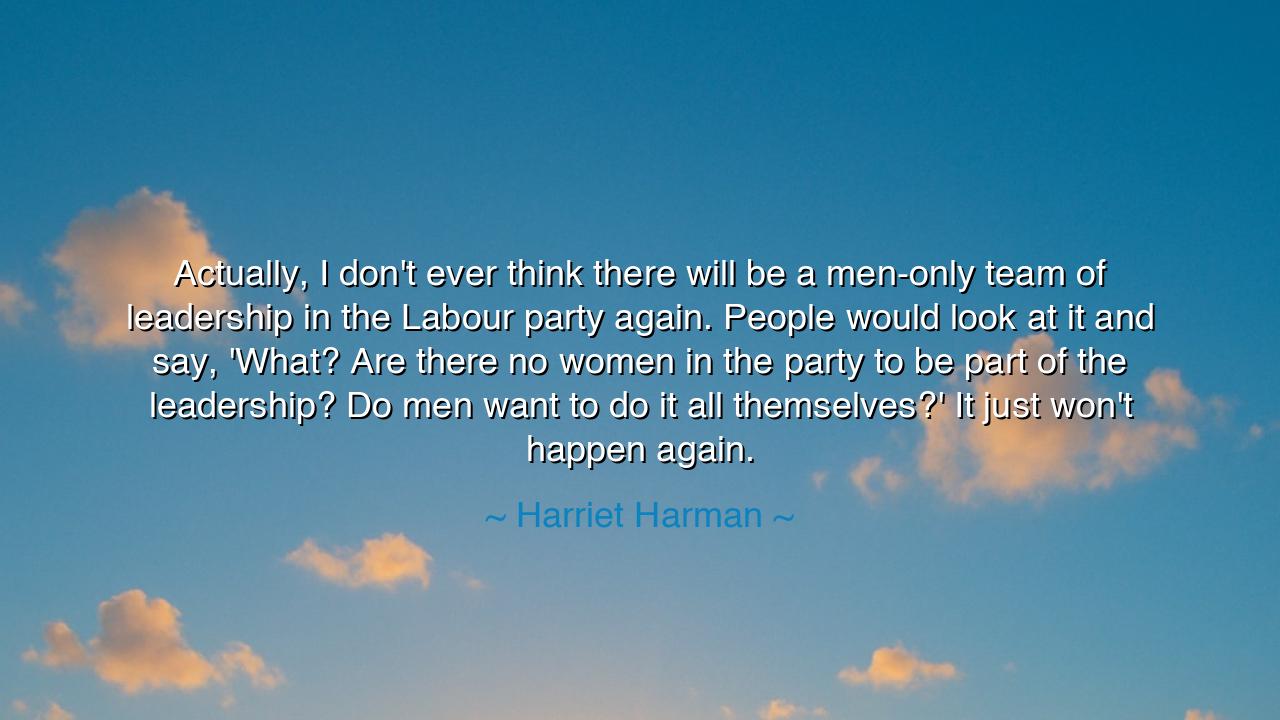
Actually, I don't ever think there will be a men-only team of
Actually, I don't ever think there will be a men-only team of leadership in the Labour party again. People would look at it and say, 'What? Are there no women in the party to be part of the leadership? Do men want to do it all themselves?' It just won't happen again.






The words of Harriet Harman—“Actually, I don't ever think there will be a men-only team of leadership in the Labour party again. People would look at it and say, ‘What? Are there no women in the party to be part of the leadership? Do men want to do it all themselves?’ It just won't happen again”—are both a declaration and a prophecy. They arise from the long and hard-fought struggle for equality, spoken by one who has walked through the crucible of change and emerged bearing the banner of justice. In them is not only pride for the progress achieved but vigilance for the future—a recognition that though the past may have been ruled by exclusion, the destiny of a fair society lies in balance, inclusion, and shared power.
Harriet Harman, one of Britain’s most enduring voices for women’s rights within the Labour Party, spoke from the vantage point of both experience and transformation. For decades, politics in Britain—and indeed much of the world—was a sphere dominated by men, its councils echoing only with male voices, its decisions often blind to the realities faced by women. Harman’s statement emerged not from arrogance but from the deep current of history itself—a history where women struggled to gain even the smallest foothold in the halls of power. To declare that “it just won’t happen again” is not merely to predict, but to affirm that the moral progress of a nation has reached a point of no return.
The origin of this conviction can be traced through the tides of political awakening in the twentieth century. It is the echo of Emmeline Pankhurst’s suffragettes chaining themselves to railings for the right to vote. It is the voice of Barbara Castle, who fought for equal pay, and of countless unnamed women who carried petitions, raised families, and worked in silence so that one day the silence would be broken. Harman’s words represent the culmination of this lineage—the moment when the demand for representation transforms into expectation, when equality ceases to be an aspiration and becomes the standard of justice.
To understand her vision, one must recall how easily the powerful forget the excluded. There was a time when the absence of women in leadership passed without notice, as though nature itself decreed politics to be a masculine pursuit. Yet with each generation, the world’s conscience evolved. The wars of the twentieth century taught humanity that strength is not confined to gender—for when the men went to battle, it was women who held nations together, managing homes, factories, and governments. The modern age learned, often painfully, that wisdom, compassion, and courage are not born of anatomy, but of experience. Thus, when Harman says that an all-male leadership “just won’t happen again,” she speaks from this accumulated wisdom—the truth that society has outgrown its blindness.
History offers its share of examples where diversity of leadership transformed nations. When Golda Meir rose in Israel, when Indira Gandhi stood in India, when Margaret Thatcher commanded Britain, the world saw that leadership shaped by both feminine and masculine energies could yield balance and vision. Yet Harman’s statement goes further: it does not celebrate token figures but calls for permanent equilibrium—for a world where equality is not symbolic but systemic, where women are not exceptions to the rule but co-authors of the rule itself. Her words envision a new normal, where leadership reflects the full measure of humanity.
The lesson within this quote is both moral and practical: that justice is not self-sustaining—it must be guarded by consciousness. The moment society ceases to question representation, inequality begins to creep back under the guise of tradition or convenience. Thus, Harman’s voice is a torch for vigilance. It tells us to look upon every institution—be it political, corporate, or communal—and ask, “Who is missing from this table?” For where any group is absent, wisdom itself is diminished. The shared leadership she envisions is not a matter of fairness alone, but of strength, for no vision of the future can be whole when half of humanity is excluded from shaping it.
Therefore, let her words be remembered not merely as the assertion of a politician, but as a moral covenant for future generations. Let them remind us that equality is not a gift granted by the powerful, but a birthright recognized by the just. Let every organization, every nation, every generation heed her message: that leadership, to be worthy of its name, must mirror the fullness of the people it serves. And as long as there are voices like Harriet Harman’s—firm, wise, and unyielding—the dream of true equality will not fade, but will continue to rise, like the dawn that banishes the long night of silence.






AAdministratorAdministrator
Welcome, honored guests. Please leave a comment, we will respond soon